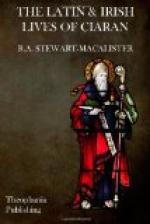The angels grinding for Ciaran reappear in incident XVIII: this is a frequent type of favour shown to saints. Angels ground for Colum Cille at Clonard (LL, 850), swept out a hearth for Patrick (LL, 121), and harvested for Ailbe (CS, 241).
Beoit an Uncle.—This is an important link between incidents XII and XIII in LA. Its bearing upon the question of the origin of Ciaran’s family has already been noticed.
The Oxen ploughing.—Incident XIII would be meaningless if we did not understand from it that at the time of the formation of the story it was not customary to use horses in the plough. This is an illustration of the way in which these documents, unhistorical though they may be in the main, yet throw occasional sidelights, which may be accepted as authentic, on ancient life.
King Furbith.—I have not succeeded in tracing this personage, who reappears in incident XXVII. But the story of his cauldron is found in the Life of Ciaran of Saigir (CS, 815), in a rather different form—to the effect that he deposited his considerable wealth for safe-keeping with Ciaran, who was already abbot of Clonmacnois. Ciaran promptly distributed it to the poor. Furbith was human enough to be annoyed at this breach of trust, and ordered Ciaran to be summoned before him in bonds. This done, he addressed him “insultingly,” as the hagiographer puts it, in these words: “Good abbot, if thou wilt be loosed from bonds, thou must needs bring me seven white-headed red hornless kine:[15] and if thou canst not find them, thou shalt pay a penalty for my treasures which thou hast squandered.” Ciaran undertook to provide the required cattle, “not to escape these thy bonds, which are a merit unto me, but to set forth the glory of my God”; and therefore he was set free to obtain them. Another variant of these stories—a common type, in which the saint gives away the property of other people in alms, but has his own face miraculously saved—is illustrated by the tale of Coemgen, who, when a boy was pasturing sheep. He gave four of them to beggars, but when the sheep were led home at night the number was found complete “so that the servant of Christ should not incur trouble on account of his exceeding charity” (VSH, i, 235).
The site of Cluain Cruim (LA) is unknown (perhaps Clooncrim, Co. Roscommon). The Desi (VG), or Dessi, were a semi-nomadic pre-Celtic people once established in the barony of Deece, Co. Meath, but afterwards in the baronies of Decies in Waterford: both these baronies still bear their name. A branch of them settled in Wales. Evidently the donors of the cauldrons which purchased the freedom of the saint were of the Decies; they are said to have been Munster folk (the name of the province is variously spelled).
XV. HOW CIARAN REPROVED HIS MOTHER (LA, LC)
I have found no parallel to this story; it contains no miraculous element, and may quite possibly be at least founded on fact. Its chief importance is the prominence given to the materfamilias.




